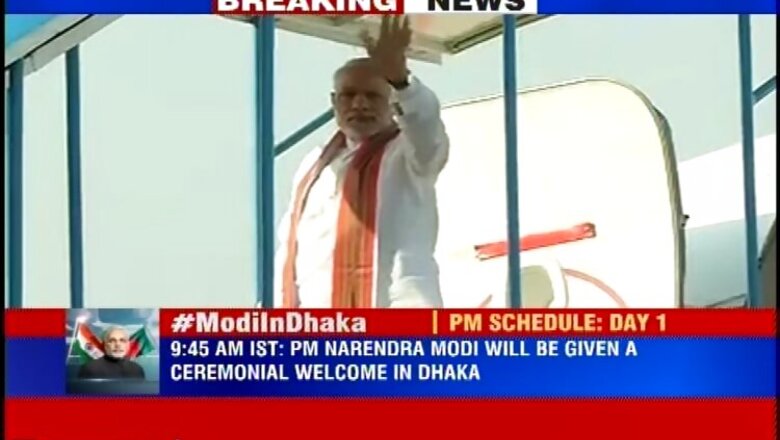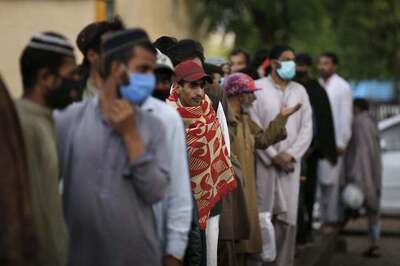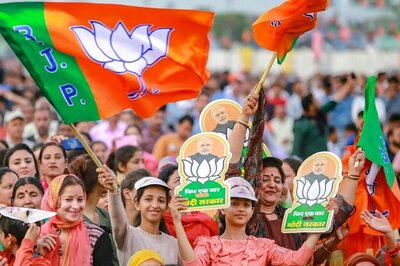
views
New Delhi: Prime Minister Narendra Modi on Saturday left for two-day trip to Bangladesh. In his maiden visit to the neigbouring country, Modi and his Bangladeshi counterpart Sheikh Hasina will sign the crucial Land Boundary Agreement.
Before his departure, Modi tweeted, "Leaving for Bangladesh. This visit is going to strengthen the bond between our nations, benefitting people of our countries and our region."
In the recently concluded Budget Session, Parliament had passed a historic constitution amendment bill seeking to settle India's 41-year-old border issue with Bangladesh. The bill will operationalise the India-Bangladesh Land Boundary agreement that provides for exchange of 161 enclaves between the two countries.
The Prime Minister will have a tight schedule as besides holding detailed talks with Hasina, he will attend several programmes and pay a visit to the Memorial of the 1971 liberation war.
Besides signing pacts to improve connectivity between the two countries, there will be efforts by both the sides to enhance trade.
Bangladesh is an important trading partner for India, with two-way trade in 2012-2013 standing at $5.34 billion and India's exports to Bangladesh accounting for $4.776 billion besides imports of $0.564 million.
Modi and Hasina will flag-off the bus service between Kolkata and Agartala via Dhaka and the Dhaka-Shillong-Guwahati bus service.
The two countries are keen to strengthen railway connectivity, particularly to revive railway links which were in existence prior to 1965.
The two countries are also set to sign a coastal shipping agreement to facilitate sailing of small vessels from India to various ports in Bangladesh which now go through Singapore.
India will also push for involvement of Indian companies in setting up of ports in that country.
The issue of Bangladesh, Bhutan, India and Nepal (BBIN) Motor Vehicle Agreement is also likely to figure in the talks Modi will have with Hasina.
India feels improving connectivity with Bangladesh will help linking the Northeastern region with Southeast Asia.
On the trade front, there will be efforts to spur Indian investment in Bangladesh and an MoU may be signed to facilitate setting up of Special Economic Zones by Indian companies in that country.
The current volume of bilateral ties between India and Bangladesh are on an upswing ever since the Hasina government came to power in January, 2009 and the Indian side will make every effort to strengthen the relationship considering its strategic interests.
Bangladesh and India share a 4,096-km-long border, most of which is porous, and both the countries are likely to try and find ways to enhance security cooperation, particularly to further contain northeast insurgent groups.
The Hasina government has taken steps against northeast terrorists who used to take refuge in Bangladesh. There has been perceptible decline in activities of Pakistan-backed fundamentalist elements in Bangladesh, and Modi would like to further cement bilateral ties with the Hasina government considering India's strategic interests.
India has already announced that the long-pending Teesta water-sharing pact with Bangladesh will not be signed during the visit.
The Teesta deal was set to be inked during the then Prime Minister Manmohan Singh's visit to Bangladesh in September, 2011 but was postponed at the last minute due to objections by West Bengal Chief Minister Mamata Banerjee, who had also dropped out of the Prime Ministerial delegation.
Teesta water is crucial for Bangladesh, especially in the leanest period from December to March when the water flow often temporarily comes down to less than 1,000 cusecs from 5,000 cusecs.
Leaving for Bangladesh. This visit is going to strengthen the bond between our Nations, benefitting people of our countries & our region.— Narendra Modi (@narendramodi) June 6, 2015
(With additional information from PTI)




















Comments
0 comment